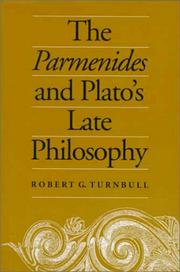| Listing 1 - 4 of 4 |
Sort by
|
Book
ISBN: 9783534221523 Year: 2009 Publisher: Darmstadt Wissenschaftliche Buchgesellschaft
Abstract | Keywords | Export | Availability | Bookmark
 Loading...
Loading...Choose an application
- Reference Manager
- EndNote
- RefWorks (Direct export to RefWorks)
Philosophie. --- Plato, --- Plato. --- Dialogues (Plato).
Book
ISBN: 9789004390010 9004390014 9004390022 9789004390027 Year: 2019 Publisher: Leiden Boston
Abstract | Keywords | Export | Availability | Bookmark
 Loading...
Loading...Choose an application
- Reference Manager
- EndNote
- RefWorks (Direct export to RefWorks)
In The Gatekeeper: Narrative Voice in Plato’s Dialogues Margalit Finkelberg offers the first narratological analysis of all of Plato’s transmitted dialogues. The book explores the dialogues as works of literary fiction, giving special emphasis to such topics as narrative levels, focalization, narrative frame, and metalepsis. The main conclusion of the book is that in Plato the plurality of the speakers’ opinions is not accompanied by a plurality of points of view. Only one perspective is available, that of the narrator. Contrary to the widespread view, Plato’s dialogues cannot be considered multivocal, or “dialogic” in Bakhtin’s sense. By skillful use of narrative voice, Plato unobtrusively regulates the readers’ reception and response. The narrator is the dialogue’s gatekeeper, a filter whose main function is to control how the dialogue is received by the reader by sustaining a certain perspective of it.
Discourse analysis, Narrative. --- Plato. --- Narrativität. --- Plato, --- Dialogues (Plato). --- Narrative discourse analysis --- Narration (Rhetoric) --- Plato --- Discourse analysis, Narrative --- Fiction

ISBN: 0802042368 9786612025877 1282025872 1442682019 9781442682016 9781282025875 9780802042361 Year: 1998 Publisher: Toronto, Ont. University of Toronto Press
Abstract | Keywords | Export | Availability | Bookmark
 Loading...
Loading...Choose an application
- Reference Manager
- EndNote
- RefWorks (Direct export to RefWorks)
"From antiquity, Plato's Parmenides has been considered an enigma. In this book Robert Turnbull offers a translation and explanation of the Parmenides, using his interpretation to elucidate Plato's major late dialogues." "Turnbull claims that, in the Parmenides, Plato abandoned the earlier Phaedo account of form-participation, and instead, worked out the metaphysics of form-participation and mathematics that grounds the framework of his late philosophy. Relying on the testimony of Aristotle, Euclid, and Plotinus, and rejecting most modern accounts, Turnbull finds in the Parmenides a radical departure that clarifies and illuminates Plato's mature Pythagoreanism."--Jacket.
Philosophy, Ancient --- Philosophie ancienne --- Plato. --- Plato --- Aflāṭūn --- Aplaton --- Bolatu --- Platon, --- Platonas --- Platone --- Po-la-tʻu --- Pʻŭllatʻo --- Pʻŭllatʻon --- Pʻuratʻon --- Πλάτων --- אפלטון --- פלאטא --- פלאטאן --- פלאטו --- أفلاطون --- 柏拉圖 --- 플라톤 --- Electronic books. --- Plato. -- Dialogues. --- Plato. -- Parmenides. --- Philosophy --- Philosophy & Religion --- PHILOSOPHY / History & Surveys / Ancient & Classical. --- Parmenides (Plato) --- Dialogues (Plato) --- Platōnos Parmenidēs (Plato)
Book
ISBN: 1137580437 1137580445 Year: 2016 Publisher: London : Palgrave Macmillan UK : Imprint: Palgrave Macmillan,
Abstract | Keywords | Export | Availability | Bookmark
 Loading...
Loading...Choose an application
- Reference Manager
- EndNote
- RefWorks (Direct export to RefWorks)
This book rethinks Plato’s creation and use of myth by drawing on theories and methods from myth studies, religious studies, literary theory and related fields. Individual myths function differently depending on cultural practice, religious context or literary tradition, and this interdisciplinary study merges new perspectives in Plato studies with recent scholarship and theories pertaining to myth. Significant overlaps exist between prominent modern theories of myth and attitudes and approaches in studies of Plato’s myths. Considering recent developments in myth studies, this book asks new questions about the evaluation of myth in Plato. Its appreciation of the historical conditions shaping and directing the study of Plato’s myths opens deeper philosophical questions about the relationship between philosophy and myth and the relevance of myth studies to philosophical debates. It also extends the discussion to address philosophical questions and perspectives on the distinction between argument and narrative. .
Philosophy.
---
Theater.
---
Philology.
---
Aesthetics.
---
Language and languages
---
Religion
---
Philosophy of Religion.
---
History of Philosophy.
---
Philosophy of Language.
---
Classical Studies.
---
Theatre and Performance Studies.
---
Plato
---
Criticism and interpretation.
---
Beautiful, The
---
Beauty
---
Esthetics
---
Taste (Aesthetics)
---
Dramatics
---
Histrionics
---
Professional theater
---
Stage
---
Theatre
---
Mental philosophy
---
Aflāṭūn
---
Aplaton
---
Bolatu
---
Platon,
---
Platonas
---
Platone
---
Po-la-tʻu
---
Pʻŭllatʻo
---
Pʻŭllatʻon
---
Pʻuratʻon
---
Πλάτων
---
אפלטון
---
פלאטא
---
פלאטאן
---
פלאטו
---
أفلاطون
---
柏拉圖
---
플라톤
---
Platon
---
Platoon
---
Philosophy (General).
---
Linguistics
---
Philosophy
---
Art
---
Criticism
---
Literature
---
Proportion
---
Symmetry
---
Performing arts
---
Acting
---
Actors
---
Humanities
---
Psychology
---
Religion—Philosophy.
---
Language and languages—Philosophy.
---
Plato.
---
Dialogues (Plato)
---
Aristokles
---
Eflātun
---
Eflatun
---
Platonius
---
Platão
---
Platōnas
---
Pseudo-Plato
---
Platao
---
Po-la-t'u
---
P'urat'on
---
P'ullat'o
---
P'ullat'on
---
Ps.-Platon
---
Pġaton
---
Aflaṭôn
---
Aplaṭôn
---
Aflāṭūn
---
Platōn
---
Pseudo-Platon
---
プラトーン
---
Պղատոն
---
פלטו
---
Philosoph
---
Athen
---
Beurer, Johannes Jakob
---
Vietor, Theodor
---
Cornarius, Janus
---
Gessner, Conrad
---
Serres, Jean <
| Listing 1 - 4 of 4 |
Sort by
|

 Search
Search Feedback
Feedback About UniCat
About UniCat  Help
Help News
News